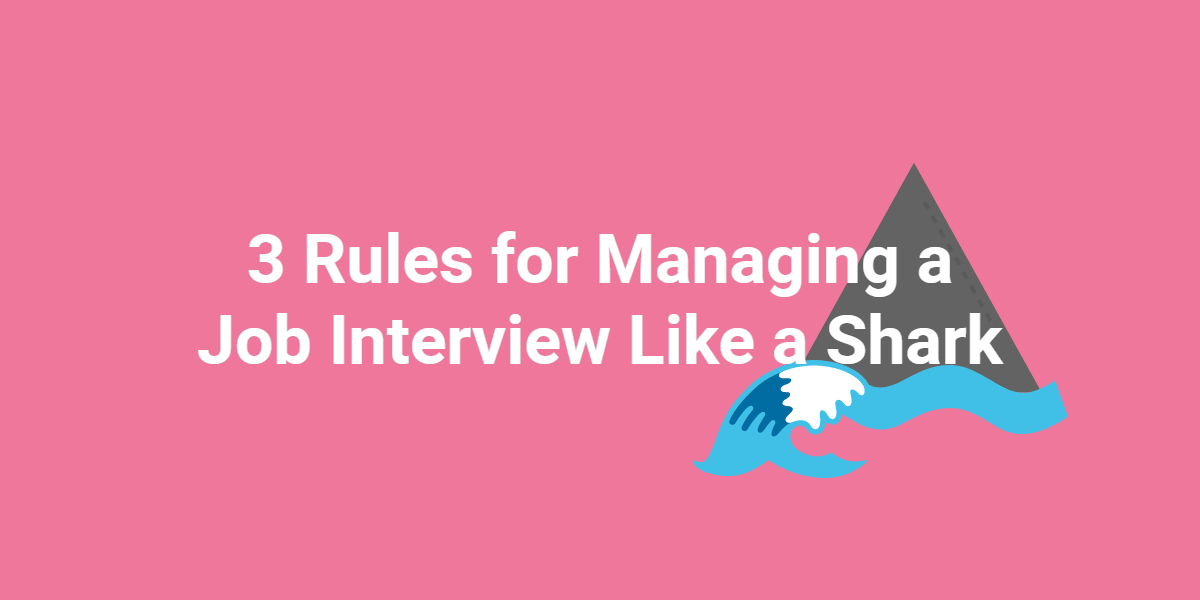You don’t need to be pitching business ideas to Mark Cuban to be in the Shark Tank. The wildly popular TV show takes you into the world of investing and entrepreneurship. As a recruiter, you play the role of a Shark during each and every job interview.
You sit down with candidates to discuss their hopes and determine if they’re the right partner for your company. This is a make-it-or-break-it moment for everyone.
You’re not just looking for someone with the right skills and experience. You also have to consider cultural fit, personality, and enthusiasm, among other key aspects.
To add to the pressure, talent acquisition isn’t always obvious. However, it’s critical that you’re investing in the right people to build a strong workforce so we asked a few experts to share their secrets to success.
To be the best recruiting Shark during a job interview, here are three rules to follow:
1.Keep the job interview on track
 In order to maintain a good balance in the interview, I make the effort to be as direct as possible. I tell them that I want to learn a bit about who they are, but mainly want to focus on the role and how their background best fits into what my hiring manager needs.
In order to maintain a good balance in the interview, I make the effort to be as direct as possible. I tell them that I want to learn a bit about who they are, but mainly want to focus on the role and how their background best fits into what my hiring manager needs.
I remind them that this approach is in their best interest. If we have a great conversation but I don’t get the critical job related information the manager needs, this isn’t going to go anywhere.
The best things recruiters can do to keep the interview on track is to notify the candidate that there’s a certain amount of time allotted for this meeting, then set the tone before the conversation begins.
If you sit back, fail to prepare, and expect a casual conversation, that is exactly what you will get. The candidate, who was given zero direction, will go off on a tangent trying to establish a connection with you and oversell their background at the same time.
You’ll have spent 30+ minutes nodding and saying ‘uh-huh,’ and at the end have nothing of value that you can present to the hiring manager.
— Pamela Shand, CEO of Offer Stage Consulting
2. Know the don’ts of interviewing
Don’t ask hypotheticals. For example, don’t ask a candidate, “Here is our problem, how would you solve it?” This is setting everyone up to fail.
 Without knowledge of your culture, past, current projects, and priorities, there is no way they can answer this question in a meaningful way. Stick to their past and not hypothetical futures – look for meaningful patterns in how they approach things, tackle projects, and problem solve using real examples.
Without knowledge of your culture, past, current projects, and priorities, there is no way they can answer this question in a meaningful way. Stick to their past and not hypothetical futures – look for meaningful patterns in how they approach things, tackle projects, and problem solve using real examples.
Also, don’t try to psychoanalyze unless you are a psychoanalyst. People can generally analyze themselves pretty accurately, but without lots and lots of training, we are terrible at analyzing others — so don’t do it.
Don’t ask questions like, “If you were a tree, what kind of tree would you be and why?” This was an actual question used by a previous employer of mine who really thought it gave them great insight into the person.
Instead, ask questions in a way that makes them analyze themselves. For example, “Why did you pick your major?” or “What drew you to apply for this position?”.
Of course, in a job interview, people tend to tell you what they think you want to hear, but if you take answers from questions like these and compare it to their stories from the past, you should be able to see if it’s at least consistent or not.
— Reid Givens, Director of Marketing at ClockShark
3. Determine fit for both sides
You need to know who the client is. Since they pay the bill, you need to match, screen, and qualify candidates based on their criteria.
 Get great examples when interviewing candidates that fit the criteria and solve the client’s problem.
Get great examples when interviewing candidates that fit the criteria and solve the client’s problem.
During the job interview, you need to find a way to maintain a balance of listening to dreams and goals, while seeing if the candidate is the right partner for your client. This is an art, not a science.
Use all the data and information you gather from both sides to determine if it’s the right fit. Then, you need to make a judgment call.
— Andy Miller, Founder of BrainWorks
—
How do you take on the Shark role during a job interview? Let us know!











